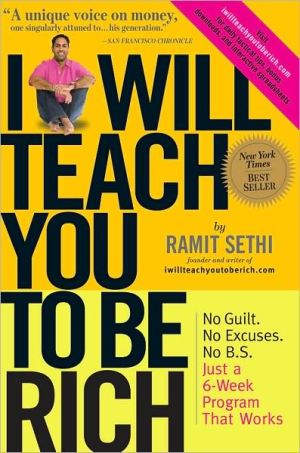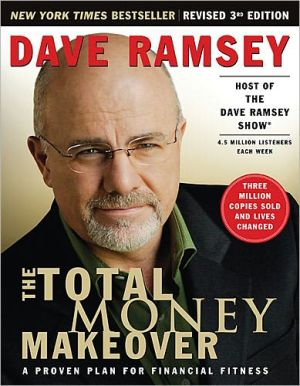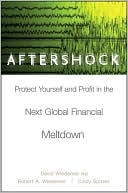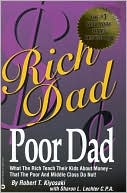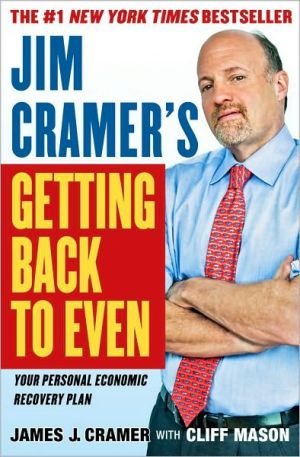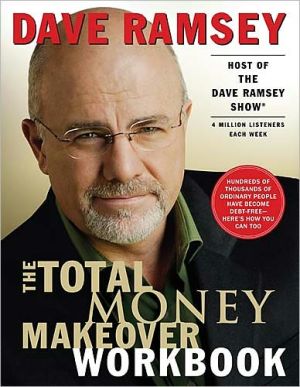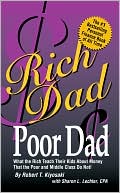I Will Teach You to Be Rich
At last, for a generation that's materially ambitious yet financially clueless comes I Will Teach You To Be Rich, Ramit Sethi's 6-week personal finance program for 20-to-35-year-olds. A completely practical approach delivered with a nonjudgmental style that makes readers want to do what Sethi says, it is based around the four pillars of personal finance— banking, saving, budgeting, and investing—and the wealth-building ideas of personal entrepreneurship.\ Sethi covers how to save time by not...
Search in google:
You don't have to be perfect to be rich. Or the smartest person in the room. Or a type-A personality. In fact, with Ramit Sethi's six-week program to financial independence, you can start with any amount of money, do just 85 percent of what he suggests, and succeed brilliantly through good times and bad.As irreverent and entertaining as he is practical and wise, Sethi explains how to beat banks and credit cards at the fee game, automate your cash flow, negotiate for a raise, manage student loans, and enjoy your lattes and Manolo Blahniks by practicing conscious spending. It's how to master your money with the least amount of effort—and then get on with your life.
Introduction: Would You Rather Be Sexy or Rich?Why do people get fat after college? The eerily similar guilt about spending and not working out. • Counterintuitive but true: We need less personal-finance information • Common excuses for not managing money • Stop debating minutiae and get something done • The key messages of I Will Teach You to Be Rich • “Rich” isn’t just about money: What does it mean to you?Chapter 1: Optimize Your Credit Cards: How to beat the credit card companies at their own gameWhy Indian people love negotiating • How credit can help you be rich • Picking the best credit card for airline miles, cash back, and rewards • Getting a card when you have no income • The six commandments of credit cards • How to negotiate with your credit card company to get fees waived and receive lower rates • Why you should always buy electronics, travel, and furniture on your credit card • What not to do with your cards • The burden of student loans • When credit cards go bad • Five steps to ridding yourself of debt • Week One: Action StepsChapter 2: Beat the Banks: Open high-interest, low-hassle accounts and negotiate fees like an IndianWhy old people are afraid of online banks—even though they offer the best new accounts you can get • How banks rake it in • Why you really need a separate savings account • Opening high-interest, no-fee accounts • Five marketing tactics banks use to trick you • My personal favorite accounts • Negotiate out of fees with your current bank (use my script) • Week Two: Action StepsChapter 3: Get Ready to Invest: Open your 401(k) and Roth IRA—even with just $50Why your friends probably haven’t invested a cent yet • Investing is the single best way to get rich • The ladder of personal finance • Everything you need to know about your 401(k) • The importance of crushing your debt • Why everyone should have a Roth IRA • Week Three: Action StepsChapter 4: Conscious Spending: How to save hundreds per month (and still buy what your love)Spend less—without making a detailed, irritating budget • The difference between cheap and frugal • Conscious spending: how my friend spends $21,000 per year going out—guilt-free • Using psychology against yourself to save • The four buckets: fixed costs, savings, investments, and guilt-free spending money • The envelope system for not overspending • How to make more money • Handling unexpected expenses • Week Four: Action StepsChapter 5: Save While Sleeping: Making your accounts work together—automaticallyThe power of defaults: Give yourself fewer choices • How to spend only three hours a month managing your money • Where does your next $100 go? • Setting up a bill-pay and transfer system that works for you • Consultants and freelancers: What about irregular income? • Week Five: Action StepsChapter 6: The Myth of Financial Expertise: Why professional wine tasters and stock pickers are clueless—and how you can beat themWe’ve been tricked by “expertise”—why financial “experts” can’t even match the market • You can’t time the market • How experts hide their poor performance • You don’t need a financial advisor • Pundits worth reading • Most mutual fund managers fail to beat the market • Why I love index fundsChapter 7: Investing Isn’t Only for Rich People: Spend the afternoon picking a simple portfolio that will make you richWhat’s your investor profile? • The beauty of automatic investing • Asset allocation: more important than the “best stock of the year!” • Convenience or control? You choose • The many flavors of stocks and bonds • Creating your own portfolio: How to handpick your investments • Investing the easy way: lifecycle funds • Feeding your 401(k) and Roth IRA • The Swenson model of asset allocation • Week Six: Action StepsChapter 8: Easy Maintenance: You’ve done the hard work: Here’s how to maintain (and optimize) your financial infrastructureFeed your system—the more you put in, the more you’ll get out • Ignore the noise • The tricky part of managing your own portfolio: rebalancing your investments • Don’t let fear of taxes guide your investment decisions • When to sell • For high achievers: a ten-year plan • Giving back—an important part of being richChapter 9: A Rich Life: The finances of relationships, weddings, buying a car, and your first houseStudent loans—pay them down or invest? • Don’t let your parents manage your money • Role reversal: How to help when it’s your parents who are in debt • The big conversation: talking about money with your significant other • Why we’re all hypocrites about our weddings (and how to pay for yours) • Negotiating your salary, I Will Teach You to Be Rich style • The smart person’s guide to buying a car • The biggest big-ticket item of them all: a house • The benefits of renting • Is real estate really a good investment? • Planning for future purchases • Parting words (cue the violins)Index
